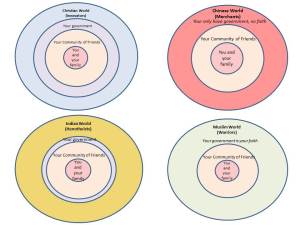We began life without any knowledge, like a blank sheet of paper. Our first experience was probably getting spanked and felt pain which led us to discover breathing on our own. When we first opened our eyes and saw our parents we did not know who they were, until we felt comfortable in their arms, and liked the taste of milk when we were hungry. Some of us did not even get this far if we were abandoned, thus beginning each of our unique life journey.
We could not have survived on our own when we were infants. The love of our parents or guardians gave us opportunities to learn the world around us, and our impressions became our beliefs. We gain experiences as we grew up first in the family, then school and workplace where we met our own peers (friends) and bosses. Many of us went to churches and places of worship which helped us expand our beliefs. Between our new peers and impressions, we enhanced our beliefs throughout our lives.

We need tools to live among the 7+ billion humans on earth. We learn language(s) to communicate, numbers and equations that one plus one must equal to two, and engage in activities like running in the playground which taught us we can fall and hurt ourselves if we ran too fast. These have been truths that verified our beliefs and became our knowledge. By definition, knowledge lags behind beliefs, because knowledge is the confirmation of beliefs. Therefore, knowledge cannot precede beliefs.
Our tools got more complicated as we grew. We usually have no choice but to learn how to interact with others with skills generically called soft and hard skills. Soft skills are more important in groups like your school or workplace. Hard skills are easier to measure and compare. Numbers evolve to algebra, geometry, calculus, differential equations, transforms, wave harmonics, etc. Applications range from sciences like oil recovery to finance like options pricing. While our life journey can require much strong soft skills vis-a-vis hard skills or vice versa, our life journey requires both soft and hard skills.
The groups that we are affiliated have their own dynamics. We know that societal moral standards were introduced 2,500 years ago across the world, but we still experienced massive holocausts such as 1) the Native Americans (by Christian conquerors) 500 years ago; and 2) the Jews (by Nazi) and Chinese and Koreans (by Japanese) during the Second World War. Even today, US companies as a group is decimating middle class Americans through “trickle-down economics” endorsed by the US government to widen the wealth gap, squeezing more Americans to give up their moral standards that correlate to more use of guns to massacre fellow Americans. Companies like GM knowingly did not fix problems in their cars when the executives were receiving enormous compensation packages; and Toyota paid $1.2 billion penalty for not correcting known defects in a timely basis. Religious institutions (Muslims and Christians) want all humans to become their followers which logically mean all humans will go to hell, ignoring the Golden Rule: Do unto others what you want others to do unto you.
Our knowledge cannot be based on 100% verification of our beliefs because we have assumptions. We all believe one plus one must equal to two. The nature of encryption, for example, can change all one plus one to equal three, and still communicate meaningful messages, as long as the recipient of the message also knows one plus one equals three. This is the power of the personal relationships between the sender and receiver, just like our personal relationships with God. As long as our personal relationships include the Golden Rule (Do unto others what you want others to do unto you) we have a chance to pursue a world of harmony, respecting individual beliefs. We do the right things to make the world a better place.